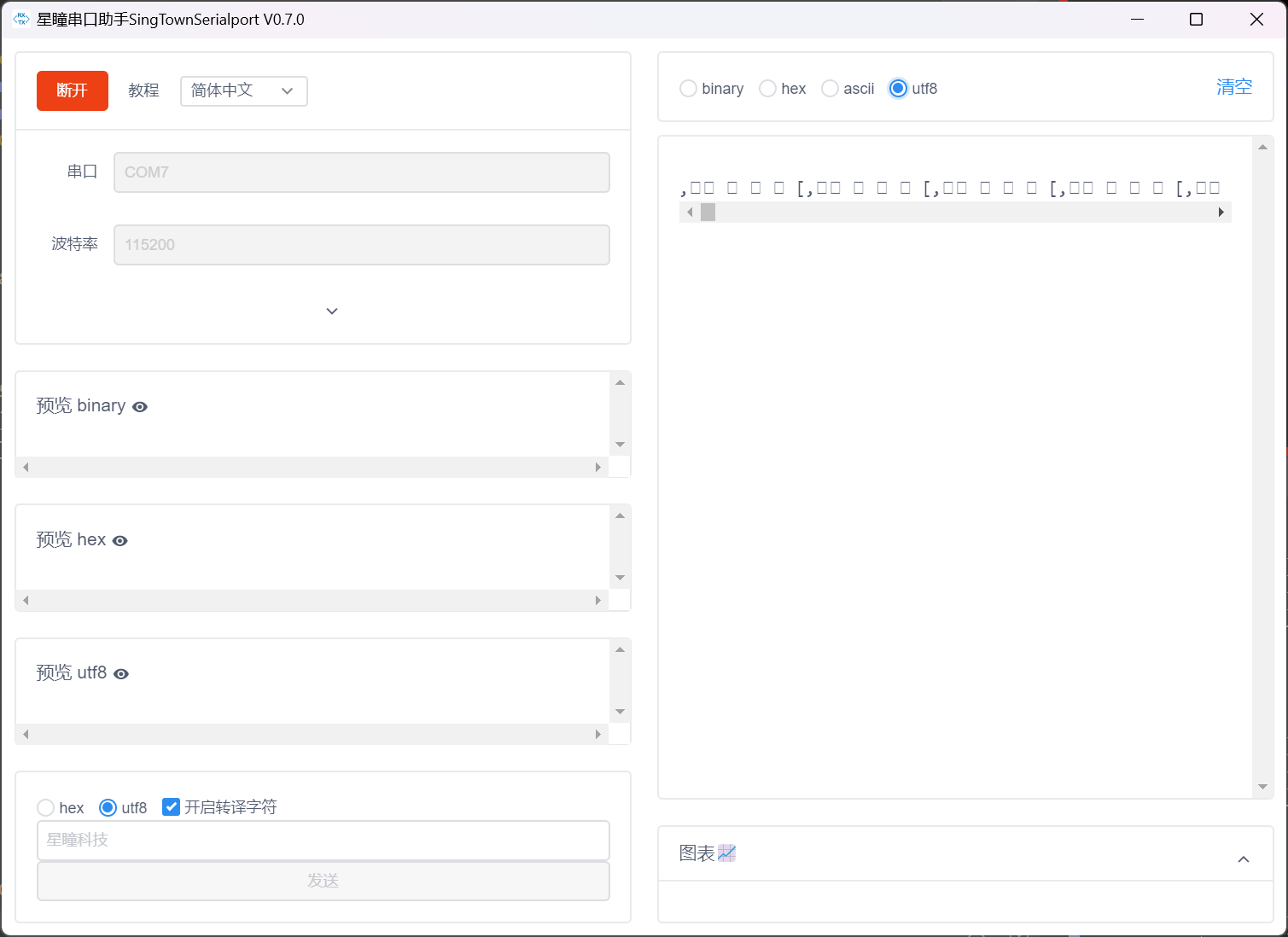串口通信,openmvide串行终端发送的数据和星瞳助手接收的数据不一样?
-

THRESHOLD = (18, 61, 14, 89, -2, 63) # Grayscale threshold for dark things... import sensor, image, time,ustruct from pyb import UART,LED #from pid import PID #rho_pid = PID(p=0.4, i=0) #theta_pid = PID(p=0.001, i=0) import pyb LED(1).on() LED(2).on() LED(3).on() sensor.reset() #sensor.set_vflip(True) #sensor.set_hmirror(True) sensor.set_pixformat(sensor.RGB565) sensor.set_framesize(sensor.QQQVGA) # 80x60 (4,800 pixels) - O(N^2) max = 2,3040,000. #sensor.set_windowing([0,20,80,40]) sensor.skip_frames(time = 2000) # WARNING: If you use QQVGA it may take seconds clock = time.clock() # to process a frame sometimes. uart = UART(3,115200) #定义串口3变量 uart.init(115200, bits=8, parity=None, stop=1) # init with given parameters #识别区域 roi1 = [(0, 17, 15, 25), # 左 x y w h (65,17,15,25),# 右 (30,0,20,15),#上 (0,0,80,60)]#停车 def outuart(x,a,flag): global uart; f_x=0 f_a=0 if flag==0: if x<0: x=-x f_x=1 if a<0: a=-a f_a=1 if flag==1: #十字 x,a,f_x,f_a=(0,0,0,1) if flag==2: #上左 x,a,f_x,f_a=(0,0,1,0) if flag==3: #上右 x,a,f_x,f_a=(0,0,1,1) if flag==4: #stop x,a,f_x,f_a=(1,1,1,2) #frame=[0x2C,18,cx%0xff,int(cx/0xff),cy%0xff,int(cy/0xff),0x5B]; #data = bytearray(frame) data = ustruct.pack("<bbhhhhb", #格式为俩个字符俩个短整型(2字节) 0x2C, #帧头1 0x12, #帧头2 int(x), # up sample by 4 #数据1 int(a), # up sample by 4 #数据2 int(f_x), # up sample by 4 #数据1 int(f_a), # up sample by 4 #数据2 0x5B) if flag!=1: uart.write(data); #必须要传入一个字节数组 else: for x in range(50): uart.write(data); #必须要传入一个字节数组 time.sleep_ms(1) p9_flag=0 #p9需检测从低变高 not_stop=0 while(True): clock.tick() img = sensor.snapshot().binary([THRESHOLD]) line = img.get_regression([(100,100)], robust = True) left_flag,right_flag,up_flag=(0,0,0) for rec in roi1: img.draw_rectangle(rec, color=(255,0,0))#绘制出roi区域 p = pyb.Pin("P9", pyb.Pin.IN) print(p.value()) if p.value()==0: p9_flag=1 if p.value()==1 and p9_flag==1: not_stop=1 p9_flag=0 if (line): rho_err = abs(line.rho())-img.width()/2 if line.theta()>90: theta_err = line.theta()-180 else: theta_err = line.theta() #直角坐标调整 img.draw_line(line.line(), color = 127) #画出直线 #print(rho_err,line.magnitude(),rho_err) if line.magnitude()>8: #if -40<b_err<40 and -30<t_err<30: #rho_pid直线左右偏移的距离,theta_err角度偏移 #rho_output = rho_pid.get_pid(rho_err,1) #theta_output = theta_pid.get_pid(theta_err,1) #output = rho_output+theta_output outdata=[rho_err,theta_err,0] print(outdata) outuart(rho_err,theta_err,0) if img.find_blobs([(96, 100, -13, 5, -11, 18)],roi=roi1[0]): #left #print('left') left_flag=1 if img.find_blobs([(96, 100, -13, 5, -11, 18)],roi=roi1[1]): #right #print('right') right_flag=1 if img.find_blobs([(96, 100, -13, 5, -11, 18)],roi=roi1[2]): #up #print('up') up_flag=1 #if not img.find_blobs([(96, 100, -13, 5, -11, 18)],roi=roi1[3]): #stop ##print('up') #stop_flag=1 if left_flag==1 and right_flag==1: outuart(0,0,1) #time.sleep_ms(5) print('shizi') continue if left_flag==1 and up_flag==1: outuart(0,0,2) print('up-left') continue if right_flag==1 and up_flag==1: outuart(0,0,3) print('up-right') continue #if stop_flag==1: #outuart(0,0,4) #print('stop') #continue #car.run(50+output, 50-output) else: #outuart(0,0,4) ##car.run(0,0) #print('stop') pass else: #car.run(50,-50) outuart(0,0,4) #if not_stop==1: #time.sleep_ms(1000) #not_stop=0 print('stop') #print(clock.fps())
-
星瞳串口助手,选择hex显示,不要选择utf8
-
为啥不能用utf-8
-
因为你发的不是utf8编码的字符串。
如果你OpenMV端用uart.write("你好"),你就可以在串口助手里用utf8看到字符串。